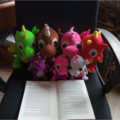Stephen Hayes reviewed Dictionary of Lost Words by Pip Williams
None
5 stars
Esmé Nicoll's widowed father was an assistant to James Murray, the editor of the first Oxford Dictionary, and because her mother was dead, she accompanied her father to the Scriptorium, the shed in the Murrays' garden, where the work of compiling the dictionary was carried on. While they sorted the slips of paper with the entries, many sent in by volunteers, five-year-old Esmé sat quietly under the table, noting the shoes and socks worn by the editorial assistants.
One day one of the slips falls from the table, and when no one bends down to retrieve it, Esmé puts it in her pocket, and later hides it away in an old trunk belonging to Lizzie Lester, the Murrays' housemaid, who is only a few years older than Esmé herself. So Esmé becomes a collector of lost words, words that are discarded from the dictionary, words that are lost inadvertently, and …
Esmé Nicoll's widowed father was an assistant to James Murray, the editor of the first Oxford Dictionary, and because her mother was dead, she accompanied her father to the Scriptorium, the shed in the Murrays' garden, where the work of compiling the dictionary was carried on. While they sorted the slips of paper with the entries, many sent in by volunteers, five-year-old Esmé sat quietly under the table, noting the shoes and socks worn by the editorial assistants.
One day one of the slips falls from the table, and when no one bends down to retrieve it, Esmé puts it in her pocket, and later hides it away in an old trunk belonging to Lizzie Lester, the Murrays' housemaid, who is only a few years older than Esmé herself. So Esmé becomes a collector of lost words, words that are discarded from the dictionary, words that are lost inadvertently, and a few that she pilfers from the sorting table. When her pilfering ways are discovered, she is banished for a while from the Scriptorium, but her interest in words continues and as she grows older she begins collect them on her own account.
She also becomes aware that the all-male lexicographers are not aware of, or not interested in words that are used only by women, or words that are spoken by the common people rather than by the educated classes, and so becomes aware of social inequalities in late-Victorian and Edwardian England.
[b:The Dictionary of Lost Words|49354511|The Dictionary of Lost Words|Pip Williams|https://i.gr-assets.com/images/S/compressed.photo.goodreads.com/books/1576570225l/49354511.SY75.jpg|74793187] is only semi-fictional. Not for [a:Pip Williams|15290215|Pip Williams|https://images.gr-assets.com/authors/1621533011p2/15290215.jpg] the usual disclaimer that none of the characters bear any resemblance to any actual person, living or dead. James Murray and most of the other editorial assistants, including members of Murray's family, are the real people, and they appear in a photograph at the end of the book. Of course their conversations are imagined, but some of the things they say are taken from their own writings, or contemporary reports and memoranda. One can learn quite a lot of the way in which the Oxford Dictionary was compiled from the book.
I really enjoyed reading it, not just because, having worked as a proof reader and editor at various times, I have an interest in words and how they are used, but also because Esmé and the other characters, fictional or otherwise, come across as real people, so that one shares their joys and sorrows, and cares about what happens to them.



